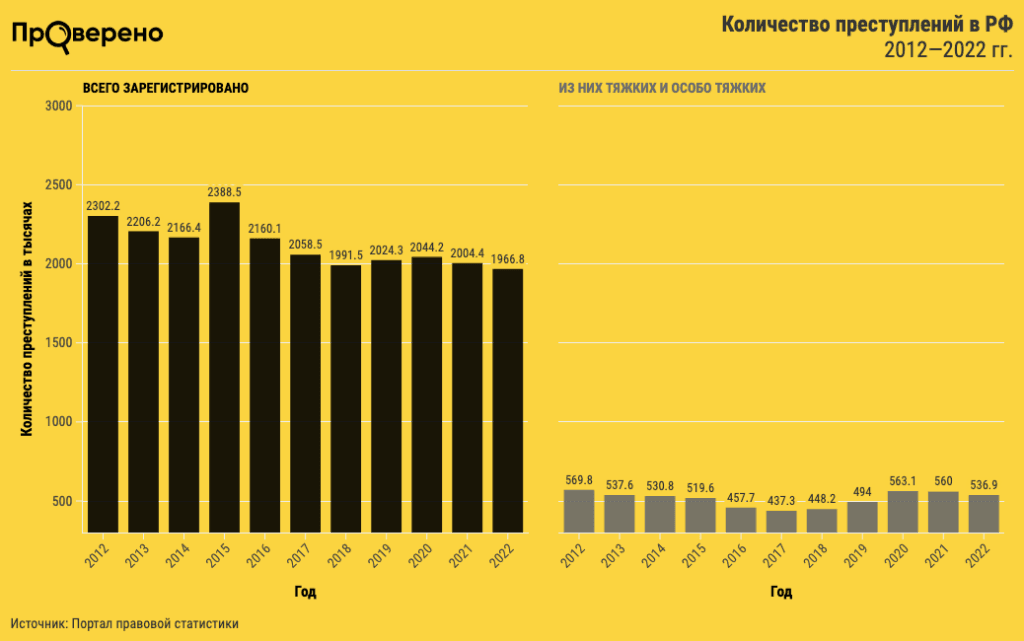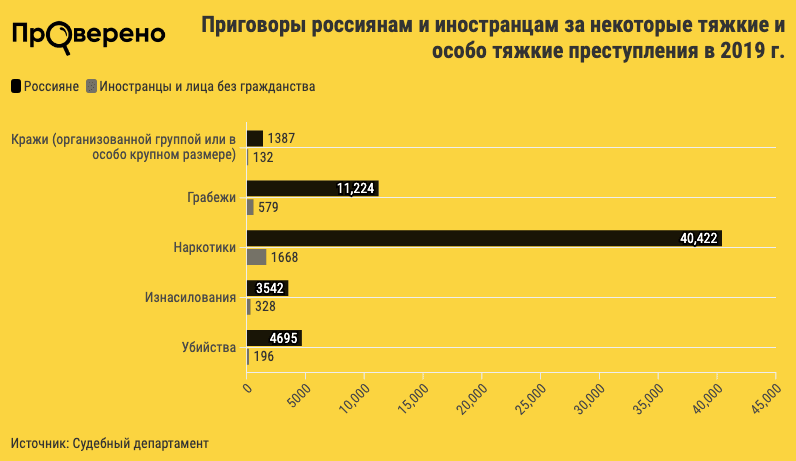There is a widespread belief that most crimes, especially serious ones, in Russia are committed by visitors from other countries. We checked whether official statistics confirm this.
For many years, the narrative about the responsibility of foreigners for the majority of crimes committed in the Russian Federation has been spreading in the media, including authoritative, relaying statements by Russian officials. In 2011, Sergei Kudeneyev, who then held the post of Moscow prosecutor claimed, that “foreign citizens in Moscow commit every fifth murder, every second rape, every third robbery and every fifth theft.” An extremely high proportion of crimes committed by migrants has been reported over the past ten years "Moskovsky Komsomolets", radio Business FM, "Vesti.ru", TASS, Sputnik, Telegram channels (“Truthfulness", "Readovka explains") and many other media. In online disputes, opponents of immigration refer to the media mentioned above, sometimes claimingthat foreigners commit up to 70% of robberies and robberies. Less radical ones write about 20–30% of all crimes either in Russia or in Moscow and the Moscow region, especially noting contribution to crime from visitors from Central Asia.
To analyze the popular narrative, “Verified” turned to open data Ministry of Internal Affairs of the Russian Federation, Judicial Department at the Supreme Court and legal statistics portal Prosecutor General's Office over the past 11 years. These departments keep fairly detailed records, including separately highlighting crimes committed by foreigners, citizens of the CIS and the Baltic countries, and for some periods a detailed breakdown by type of act is available. We analyzed the total number of crimes, separately highlighting serious and especially serious ones, and calculated what proportion of them were committed by foreigners and stateless persons.

On average, about 2 million crimes are registered in Russia annually, about a quarter of them have to to severe and especially severe. Among those include intentional crimes, for the commission of which the Criminal Code of the Russian Federation provides for a maximum penalty of imprisonment for a term of more than five and more than ten years, respectively (serious crimes also include unintentional crimes, the term for which does not exceed 15 years). IN in particular, this is murder, rape, drug and weapons trafficking, kidnapping, terrorism, robbery, some types of tax crimes.
Crimes committed by foreigners and stateless persons make up a fairly small proportion of all those recorded.

So, for example, in 2019 (the latest statistics seem not entirely typical due to the coronavirus pandemic and the full-scale invasion of Ukraine), according to the legal statistics portal of the Prosecutor General’s Office, 2,024,300 crimes were registered in Russia, of which 34,900 were committed by foreigners and stateless persons, that is, 1.72%. The situation changes slightly from year to year - the share of crimes committed by foreigners in 2012–2022 rarely exceeded 2% of the total number registered.
Opponents of immigration, in response to such calculations, often argue that it is necessary to count not the share of crimes committed by migrants out of the total number of known violations of the Criminal Code, but the number of crimes that occur among citizens of the Russian Federation and foreigners. But a simple formula allows you to calculate this proportion. By official Russian and independent According to data, before the COVID-19 pandemic and the restrictions introduced in connection with it, on average, about 11 million foreign citizens permanently resided in Russia, and the country’s population in official statistics (taking into account population of annexed Crimea) since 2015 is estimated at approximately 146 million people. Thus, in 2019, there were 317 crimes per 100,000 foreign citizens and stateless persons, and 1,386 per 100,000 Russians. Approximately the same ratio of these two values is observed in other years for which statistics are available.
Online debates and statements by some officials have repeated the stereotype that although migrants commit fewer crimes, they commit more serious crimes, including murder and rape. Although there is no such breakdown in the data of the legal statistics portal for crimes registered during the year, this statement can be verified using data judicial statisticscontaining information about sentences passed. Thus, in 2019, a total of 597,441 people were convicted under articles of the Criminal Code of the Russian Federation, of which 20,151 were citizens of other countries and stateless persons (3.37%).

If we limit ourselves to serious and especially serious crimes, then the share of foreigners is slightly higher; from year to year it remains at approximately 4–5%. From a quarter to a third of these sentences are imposed for drug crimes, while the share of sentences to foreigners from all court decisions on serious drug offenses remains around 5%. The number of foreigners convicted of murder averages 4% of the total, for rape and violent sexual assault - 8.5%, for aggravated theft - 8.5%, for robbery - 5%. Statistics show that the shares of foreigners and citizens of the Russian Federation convicted of major serious and especially serious crimes generally correspond to their shares in the country’s population - in other words, migrants are convicted on average no more often and no less often than Russians for such offenses.
A significant portion of news media publications cited by proponents of the hypothesis of widespread migrant crime contain either clickbait headlines or imprecise wording or distorted data, or both. Many publications also do not take into account that sometimes by visitors, officials mean not only foreigners, but also internal migrants, that is, citizens of the Russian Federation registered in one region (primarily in national republics), but who committed a crime in another. Judging by the same demographic tables of the Judicial Department of the Supreme Court, from year to year the number of convicted internal migrants (including, for example, St. Petersburg residents who committed a crime in Moscow) is approximately equal to the number of convicted foreigners. However, clarifications are rarely made, which likely fuels a persistent xenophobic narrative.
For example, in the material of Business FM radio approvedthat migrants committed every third crime in Moscow and the Moscow region in 2020. This statement is contained in the title and introductory part of the article. However, the main text contains data from the Prosecutor General’s Office: “In 2020, a third of the crimes committed by migrants, as before, occurred in Moscow (65,000) and the Moscow region (5,000).” A third of the crimes committed by migrants in Russia as a whole turned into a third of all crimes in Moscow and the Moscow region, which does not correspond to statistical data.
Article in Moskovsky Komsomolets from 2020 is entitled “The number of crimes of migrants in Russia is astonishing: fresh data.” However, in the article itself, the data is by no means “astounding” - 3.5% of all crimes in Russia were committed by foreigners, although it is noted that the percentage in Moscow and the Moscow region is several times higher than the average.
As for Moscow specifically, in the Russian capital the percentage of registered crimes committed by foreigners is indeed higher than the average for the Russian Federation. This is probably due to the higher concentration of migrants in Moscow relative to other cities (in 2019, according to official According to data, 1.6 million visitors from other countries lived and worked in Moscow). However, according to data legal statistics portal, in reality, migrants account for only about 4.5% of all crimes registered in the capital.

Thus, all available data refute the common assertion, since over 95% of crimes in Russia are committed by citizens of the Russian Federation. The widespread crime among migrants is nothing more than a myth, fueled by incorrect or vague statements by officials and supported by the bias of some Internet users and some media. Foreigners and stateless persons are not ahead of Russians either in the number of crimes in general or in the number of grave and especially grave violations of the Criminal Code of the Russian Federation. At the same time, the statistics remain relatively stable - over the last decade this ratio has changed slightly.
Cover photo: Federal Migration Service of Russia
Students from the RANEPA Media Journalism program took part in the data collection: Angelina Nazyrova, Aytaj Akbarli, Marina Boger, Elizaveta Belyakova.
- Myths about migrants: a special project of the publication “Takie Dela”
- How propagandists incite hatred towards migrants, and the Ministry of Internal Affairs blames “foreign agents” for this
If you find a spelling or grammatical error, please let us know by highlighting the error text and clicking Ctrl+Enter.






